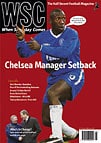 The recent racism row between Millwall and Burnley overlooked the work both clubs do to improve community relations. Glen Poole reports from the Lancashire town on their current equality projects
The recent racism row between Millwall and Burnley overlooked the work both clubs do to improve community relations. Glen Poole reports from the Lancashire town on their current equality projects
What are Burnley doing to tackle racism? Alastair Campbell sparked a major incident in March when he accused Millwall fans of racism towards Burnley players in his Times column. Stan Ternent, Theo Paphitis and even former Radio Four bad-boy Rod Liddle waded into the fight. But Campbell – a lifelong Burnley fan – had raised an important point that was lost amid the sound of handbags clashing. It isn’t just clubs that have to take responsibility for the problem, but also fans and communities. The issue of racism beyond the terraces is particularly pertinent in Burnley, where the disturbances of 2001 and the subsequent BNP electoral gains have placed the town in the media spotlight.
Burnley have the highest attendance rate per head of population in the country. The club are arguably Burnley’s major social institution, yet the town’s true diversity is still not seen at matches. There is, though, evidence that a zero-tolerance policy is working at Turf Moor. In 2002, the council voted to commend the club for banning 19 fans found to have been chanting and singing racist songs. Last season there were just three arrests and evictions from the ground.
“We’ve taken a ten-point plan in tackling racism in football,” says Burnley’s chief executive, Dave Edmundson. “All our stewards are trained how to deal with it and there’s very little trouble at the ground. Between 30 per cent and 40 per cent of the stewards are from minority ethnic backgrounds, which shows we are trying to be as inclusive as possible.”
Afrasiab Anwar, the council’s active communities development officer, supports this view of harmony on the terraces. “I go quite regularly to the midweek games,” he says, “and I can honestly say I haven’t seen any trouble in the last couple of years.” For Anwar, developing the game’s grass roots and using football to promote integration is the way forward. He says the council is building a project with BFC and local colleges to employ a full-time community football projects co-ordinator. “Together, we’re providing local clubs with support and training to develop their infrastructure. It’s all right trying to muster up mass participation, but these people have to have somewhere to go. We’re also making inroads into clubs and communities and providing opportunities to learn about each other’s cultures.”
As chairman of a predominantly Asian youth team, Daneshouse FC, Anwar has first-hand experience of the tendency to segregate. Some say he should establish an Asian league, but he is adamant his club will play in the mainstream. “In the past, Asian kids would go to predominantly white clubs and drop out after a few weeks. With us, it’s the other way round, we get white kids dropping out. The more we integrate the less it will happen. Young people are very receptive to new ideas.”
Edmundson agrees that engaging the next generation of potential supporters is the way forward. The club’s leisure and community programme has a policy of “total inclusion”. It may not sound as exciting as “total football”, but it could make a long-term contribution to promoting integration. “It’s renowned as one of the best in the country,” says Edmundson. “We have 40,000 schoolchildren from different backgrounds coming through the programme every year. We’re building up a new supporter base and want to ensure that it’s inclusive.”
There is, of course, a strong business case for widening the appeal of the club. The Asians who hire the conferencing and banqueting facilities for a wedding, or use the leisure centre for cricket practice, are as important economically as the fans passing through the turnstiles. “The club has always been the glue that sticks the community together,” says Edmundson. “We want Burnley FC to be an amenity for everyone. If you have revenue streams not determined by the bounce of the ball, then you’ve got something that is stable. You’re not beholden to the fact that when you struggle on the field your gates go down.”
As for getting more Asians actively involved in the club, Anwar acknowledges that there is a need for role models both on the pitch and in the stand. “We’re building links with the club now. We get lads as young as five and six and we take them on trips to the ground. They love it, they get really excited and if they see people like me going they’re more likely to go again.”
Anwar and Edmunson both complain that the good work being done is overlooked by the media. Perhaps Alastair Campbell could offer his expertise for free.
From WSC 207 May 2004. What was happening this month